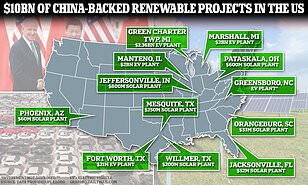Exclusive Joe Biden's green energy plan is a gift to China, experts warn, amid fears Beijing could plunder more than $100billion from US taxpayer under scheme designed to BOOST American manufacturing
- The scheme offers uncapped tax credits to firms investing in green energy, but does not block foreign companies from accessing the pot of US taxpayer money
China is already involved in a dozen such projects, prompting warnings Beijing could profit from billions in US cash
The scheme, which could cost the US taxpayer $1.2 trillion overall, was designed to improve American competitiveness in sectors that China currently dominates, including solar and electric vehicles.
The issue has also divided once tight-knit communities across America as huge Chinese corporations land in their backyards, sparking environmental and security concerns.
A proposed $2.4billion EV battery plant in Marshall, Michigan, spearheaded by Ford, has caught the attention of lawmakers after an investigation revealed four 'highly troubling' Chinese firms were tied to the project
A backlash against a plan by CCP-linked firm Gotion to build a $2.4billion EV battery plant in Green Charter Township, Michigan, saw locals overthrow their entire township board after it backed the proposal.
'The bottom line is that if you take markets like electric vehicle (EV) batteries, or solar cells, where China already has a dominant global position, and you allow its firms to own facilities in the US and access the US taxpayer, you're allowing them to extend their global monopoly.'. said Jeff Ferry, chief economist at the non-profit Coalition for a Prosperous America.
Billions on the way to Beijing?
The 2022 Inflation Reduction Act (IRA) was hailed by Democrats as a significant step forward in combating climate change while reviving US manufacturing.
Unlike similar Obama-era legislation, it offers tax credits based on output, rather than investment, allowing federal support to grow with production.
This has been welcomed by some within the US energy sector for finally providing it with the muscle it needs to compete with China.
But concerns have been raised over the spiraling costs of the scheme - and the fact that Chinese firms can access it.
An initial estimate by the Joint Committee on Taxation (JCT), published by the Congressional Budget Office (CBO), put the total cost of the scheme at $369 billion by 2033.
Goldman Sachs, however, published an analysis in March last year suggesting the figure was likely to be closer to $1.2 trillion.
The total cost includes a myriad of green subsidies, but those relevant to the production of solar and EV batteries are now estimated to cost anywhere between $133 billion by JCT estimates and $190 billion, according to Goldman Sachs.
The US Treasury has said Chinese companies make up around 15 per cent of all US solar manufacturing investment following the IRA's passage.
China owns 383,935 acres of US farmland as of December 2021, with almost half of it in Texas
Ferry believes Chinese firms could plausibly replicate their current global market shares in solar (80 per cent) and EV batteries (56 per cent) if they are allowed unfettered access to the US market.
If this was the case, he estimates more than $100 billion of US taxpayer money could be funneled to Beijing via the IRA.
See how the locals are fighting back and winning.
They just fired their entire town board who allowed the Chinese to come in.
See the article with videos:
Beijing could plunder more than $100bn in US green energy incentives Joe Biden's green energy plan is a gift to China, experts warn, amid fears Beijing could plunder more than $100billion from US taxpayer under scheme designed to BOOST American manufacturing | Daily Mail Online


